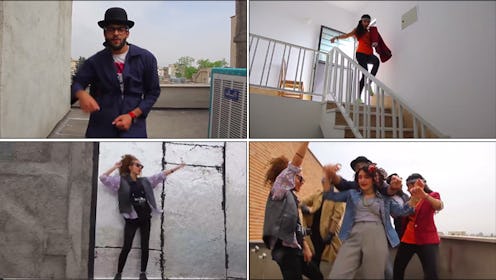News
Iranians Arrested For Making A "Happy" Video

In spite of Iranian President Hassan Rouhani's attempts to relax Internet censorship, the country is facing fierce condemnation both inside and out: Iran arrested a group of young Iranians for making a "Happy" video inspired by Pharrell Williams' hit, and then forced them to repent on state television. The group of youths made the grave mistake of filming themselves — both boys and girls — dancing to "Happy", without veils, and then sharing "Happy in Tehran" online.
Different sources are citing between six and 13 people arrested in connection with the "Happy in Tehran" clip, posted last month. The video, now removed, features six young men and women dancing to Pharrell Williams' "Happy", and ends with credits that read: "Happy was an excuse to be happy. We enjoyed every second of making it. Hope it puts a smile on your face."
Before being taken down, it had gathered 165,000 views on YouTube, becoming a viral sensation that soon made itself a target for the authorities. According to the New York Times, police chief Hossein Sajedinia called the video "a vulgar clip which hurt public chastity."
It's ironic timing to have arrested people in connection with the Web. Only two days ago, President Rouhani emphasized the importance of the internet, Tweeting his support for it: “Why are we so nervous? Why don’t we trust our youth?" But it's perhaps not unexpected: the country has a tense history with the web. Facebook has been off the table in Iran for a while and only last week, the country also banned Viber and Google Sites, and made VPN software illegal.
Only a few weeks ago, several tech bloggers were sent to prison after being accused of collaborating with groups during the country's "Twitter Revolution". According to a tweet from the New York Times' Thomas Erdbrink, there is a well-known chasm between what the Iranian government chooses to do and its judiciary.
Although it's still not clear what charges the arrested people face, it's possible the women will face repercussions for being without their veils in a country where "morality police" ensure that females cover themselves from head to toe. Regardless, the move has faced an almost immediate social media backlash, with Twitter users using the hashtag #freehappyiranians to condemn the Iranian authorities. Even Pharrell himself tweeted his disgust with the arrest.
In spite of the risks of arrest, social media continues to be used as a form of resistance, even in countries in which it is banned. Recently, an Iranian journalist who currently lives in exile — and who faces arrest on returning to Iran — started a social media campaign with the hashtag #MyStealthyFreedom. It made headlines when it went viral: Over 30,000 women posted photos of themselves not wearing their veils; the page has already earned more than 200,000 likes.
And social media has been used increasingly in reaction to questionable arrests. In January, Sweden faced a Twitter campaign after a Malaysian couple was detained for weeks after slapping their 12-year-old son on the hand. Both Saudi Arabia and Egypt have faced an onslaught of social media campaigns after multiple arbitrary arrests. Last year, over 3,000 people used social media to demand the release of a U.S. citizen who'd been imprisoned in Iran.
Image: BBC/YouTube